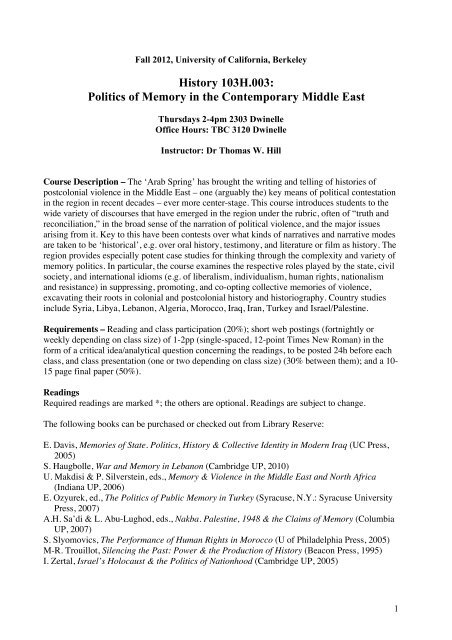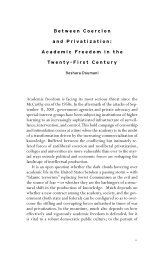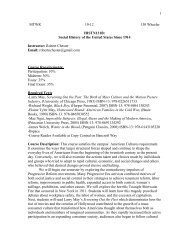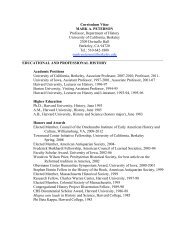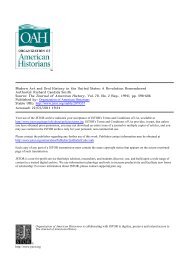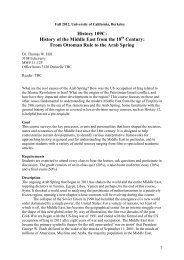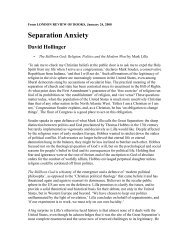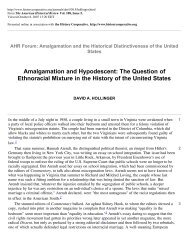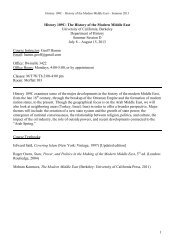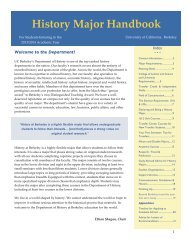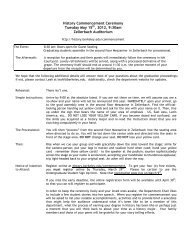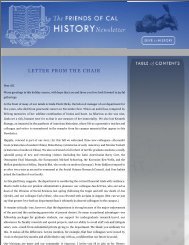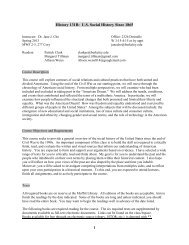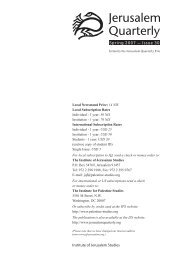103 Syllabus T W Hill.pdf - Department of History, UC Berkeley
103 Syllabus T W Hill.pdf - Department of History, UC Berkeley
103 Syllabus T W Hill.pdf - Department of History, UC Berkeley
Create successful ePaper yourself
Turn your PDF publications into a flip-book with our unique Google optimized e-Paper software.
Fall 2012, University <strong>of</strong> California, <strong>Berkeley</strong><br />
<strong>History</strong> <strong>103</strong>H.003:<br />
Politics <strong>of</strong> Memory in the Contemporary Middle East<br />
Thursdays 2-4pm 2303 Dwinelle<br />
Office Hours: TBC 3120 Dwinelle<br />
Instructor: Dr Thomas W. <strong>Hill</strong><br />
Course Description – The ‘Arab Spring’ has brought the writing and telling <strong>of</strong> histories <strong>of</strong><br />
postcolonial violence in the Middle East – one (arguably the) key means <strong>of</strong> political contestation<br />
in the region in recent decades – ever more center-stage. This course introduces students to the<br />
wide variety <strong>of</strong> discourses that have emerged in the region under the rubric, <strong>of</strong>ten <strong>of</strong> “truth and<br />
reconciliation,” in the broad sense <strong>of</strong> the narration <strong>of</strong> political violence, and the major issues<br />
arising from it. Key to this have been contests over what kinds <strong>of</strong> narratives and narrative modes<br />
are taken to be ‘historical’, e.g. over oral history, testimony, and literature or film as history. The<br />
region provides especially potent case studies for thinking through the complexity and variety <strong>of</strong><br />
memory politics. In particular, the course examines the respective roles played by the state, civil<br />
society, and international idioms (e.g. <strong>of</strong> liberalism, individualism, human rights, nationalism<br />
and resistance) in suppressing, promoting, and co-opting collective memories <strong>of</strong> violence,<br />
excavating their roots in colonial and postcolonial history and historiography. Country studies<br />
include Syria, Libya, Lebanon, Algeria, Morocco, Iraq, Iran, Turkey and Israel/Palestine.<br />
Requirements – Reading and class participation (20%); short web postings (fortnightly or<br />
weekly depending on class size) <strong>of</strong> 1-2pp (single-spaced, 12-point Times New Roman) in the<br />
form <strong>of</strong> a critical idea/analytical question concerning the readings, to be posted 24h before each<br />
class, and class presentation (one or two depending on class size) (30% between them); and a 10-<br />
15 page final paper (50%).<br />
Readings<br />
Required readings are marked *; the others are optional. Readings are subject to change.<br />
The following books can be purchased or checked out from Library Reserve:<br />
E. Davis, Memories <strong>of</strong> State. Politics, <strong>History</strong> & Collective Identity in Modern Iraq (<strong>UC</strong> Press,<br />
2005)<br />
S. Haugbolle, War and Memory in Lebanon (Cambridge UP, 2010)<br />
U. Makdisi & P. Silverstein, eds., Memory & Violence in the Middle East and North Africa<br />
(Indiana UP, 2006)<br />
E. Ozyurek, ed., The Politics <strong>of</strong> Public Memory in Turkey (Syracuse, N.Y.: Syracuse University<br />
Press, 2007)<br />
A.H. Sa’di & L. Abu-Lughod, eds., Nakba. Palestine, 1948 & the Claims <strong>of</strong> Memory (Columbia<br />
UP, 2007)<br />
S. Slyomovics, The Performance <strong>of</strong> Human Rights in Morocco (U <strong>of</strong> Philadelphia Press, 2005)<br />
M-R. Trouillot, Silencing the Past: Power & the Production <strong>of</strong> <strong>History</strong> (Beacon Press, 1995)<br />
I. Zertal, Israel’s Holocaust & the Politics <strong>of</strong> Nationhood (Cambridge UP, 2005)<br />
1
Resources<br />
Lectures & Events – The Center for Middle Eastern Studies hosts a lecture series every<br />
semester, which attracts some <strong>of</strong> the best scholars on the Middle East. For information, check<br />
out the CMES web site at: www.ias.berkeley.edu/cmes<br />
Films on the Middle East – In addition to the holdings at M<strong>of</strong>fitt & the Pacific Film Archives,<br />
take advantage <strong>of</strong> the Arab Film Festival (in San Francisco October 11 th -14 th ,<br />
arabfilmfestival.org ) and the San Francisco Jewish Film Festival ( sfjff.org )<br />
News websites – News about the Middle East is reported by the corporate media in the US in<br />
ways that are strikingly different from the coverage in Europe, Asia or the Middle East itself.<br />
Check out the corporate media, such as the New York Times & CNN, but also try to become<br />
familiar with alternative media coverage. In addition, take a look at websites <strong>of</strong> news<br />
organizations in other country to get a taste <strong>of</strong> what the rest <strong>of</strong> the world reads about the Middle<br />
East. The following is but a small sample:<br />
Britain: Guardian ( guardian.co.uk ), BBC ( bbc.co.uk/news )<br />
Egypt: Al-Ahram Weekly ( ahram.org.eg ), Egypt Independent ( egyptindependent.com )<br />
France: Le Monde Diplomatique in English ( mondediplo.com )<br />
Israel: Haaretz ( haaretz.com )<br />
Lebanon: Daily Star ( dailystar.com.lb )<br />
Additional sources:<br />
Jadaliyya ( jadaliyya.com )<br />
MERIP ( merip.org )<br />
The Forward ( forward.com )<br />
Al-Jazeera (aljazeera.com )<br />
Schedule<br />
Week 1 (August 23 rd ) Introductions<br />
Week 2 (August 30 th ) Framing the Politics <strong>of</strong> Memory, Truth and Reconciliation<br />
* M-R. Trouillot, Silencing the Past: Power and the Production <strong>of</strong> <strong>History</strong> (Beacon Press,<br />
1995)<br />
* S. Haugbolle & A. Hastrup, ‘Introduction: Outlines <strong>of</strong> a New Politics <strong>of</strong> Memory in the<br />
Middle East’ in Mediterranean Politics 13:2 (July 2008), 133-49.<br />
* A. L. Smith, ‘Heteroglossia, “common sense,” & social memory’ in American<br />
Ethnologist 1:2 (2004), 251-67<br />
* U. Makdisi & P. Silverstein, ‘Introduction: Memory and Violence in the Middle East and<br />
North Africa’ in U. Makdisi & P. Silverstein, eds., Memory and Violence in the Middle<br />
East and North Africa (Indianapolis: Indiana University Press, 2006), 1-24<br />
R. Saunders & A. Aghaie, ‘Introduction: Memory and Mourning’, Comparative Studies <strong>of</strong><br />
South Asia, Africa and the Middle East 25:1 (2005), 16-29<br />
J-W. Müller, ‘Introduction: the power <strong>of</strong> memory, the memory <strong>of</strong> power and the power<br />
over memory’ in J-W. Müller, ed., Memory and Power in Post-War Europe. Studies in<br />
2
the Presence <strong>of</strong> the Past (Cambridge UP, 2002), 1-35<br />
W. Kannsteiner, ‘Finding Meaning in Memory’ in <strong>History</strong> and Theory 41 (May 2002),<br />
179-97<br />
T.G. Phelps, Shattered Voices: Language, Violence and the Work <strong>of</strong> Truth Commissions<br />
(Philadelphia: University <strong>of</strong> Pennsylvania Press, 2004), 52-104<br />
R. A. Wilson, The Politics <strong>of</strong> Truth and Reconciliation in South Africa. Legitimizing the<br />
Post-Apartheid State (Cambridge UP, 2001), especially 1-30, 221-230<br />
Weeks 3-4 (September 6 th & 13 th ). Lebanon<br />
* S. Haugbolle, War and Memory in Lebanon (Cambridge UP, 2010)<br />
* A. Peleikis, ‘The Making and Unmaking <strong>of</strong> Memories: The Case <strong>of</strong> a Multi-Confessional<br />
Village in Lebanon’ in Makdisi & Silverstein 2006, 133-48<br />
S. Mejcher, ‘Elias Khoury: the necessity to forget and remember’, interview, Banipal 12<br />
(Autumn 2001)<br />
E. Khoury, Yalo (Archipelago Books, 2008)<br />
Films: TBC based on availability<br />
Week 5 (September 20 th ). Algeria<br />
* J. McDougall, “Savage wars? Codes <strong>of</strong> violence in Algeria, 1830s-1990s” in Third<br />
World Quarterly 26:1 (2005), 117-131<br />
* International Crisis Group (ICG), The Civil Concord. A Peace Initiative Wasted, Africa<br />
Report no.31, 9 July 2001 [20 pp.]<br />
* G. J<strong>of</strong>fe, ‘National Reconciliation and General Amnesty in Algeria’ in Mediterranean<br />
Politics 13:2 (July 2008), 213-228<br />
* B. Stora, ‘The Algerian War in French Memory: Vengeful Memory’s Violence’ in<br />
Makdisi & Silverstein 2006, 151-173<br />
* J. McDougall, <strong>History</strong> and the Culture <strong>of</strong> Nationalism in Algeria (Cambridge:<br />
Cambridge University Press, 2006), especially 1-19, 217-238<br />
For any French readers: A. Moussaoui, De La Violence en Algérie (Paris: Actes Sud, 2006),<br />
especially 391-437<br />
Week 6 (September 27 th ). Morocco<br />
*S. Slyomovics, The Performance <strong>of</strong> Human Rights in Morocco (Philadelphia: University<br />
<strong>of</strong> Philadelphia Press, 2005)<br />
F. Vairel, ‘Morocco: From Mobilisations to Reconciliation?’ in Mediterranean Politics<br />
13:2 (July 2008), 229-41<br />
Human Rights Watch (HRW), Morocco’s Truth Commission. Honoring Past Victims<br />
During an Uncertain Present, Report 17 (11) E, available at<br />
http://hrw.org/reports/2005/morocco1105<br />
N. Ghessous, Women and Political Violence During the Years <strong>of</strong> Lead in Morocco (CCHR<br />
– NIPPHR, 2009), available at http://www.ccdh.org.ma/IMG/<strong>pdf</strong>/GUIDang.<strong>pdf</strong><br />
3
Week 7 (October 4 th ). Libya<br />
* L. Anderson, ‘Legitimacy, Identity and the Writing <strong>of</strong> <strong>History</strong> in Libya,’ in E. Davis and N.<br />
Gavrielides, eds., Statecraft in the Middle East. Oil, Historical Memory nd Popular Culture<br />
(University Press <strong>of</strong> Florida, 1991), 71-90<br />
* Claudia Gazzini, ‘Assessing Italy’s Grande Gesto to Libya’, Middle East Report, 16 March<br />
2009. http://www.claudiagazzini.com/website/articoli/MERIP_reparations.<strong>pdf</strong> [9pp]<br />
* D. Vandewalle, Libya Since Independence (Ithaca: Cornell University Press, 1998), 124-31<br />
* Human Rights Watch, ‘Libya : Militias Terrorizing Residents <strong>of</strong> “Loyalist” Town, 30<br />
October 2011, available at hrw.org<br />
* Robert F. Worth, ‘In Libya, the Captors Have Become the Captive’, New York Times, 9 May<br />
2012<br />
Human Rights Watch, Truth and Justice Can’t Wait. Human Rights Developments in Libya<br />
Amid Institutional Obstacles, 12 December 2009, available at hrw.org<br />
Ali Abdullatif Ahmida, The Making <strong>of</strong> Modern Libya: State Formation, Colonization &<br />
Resistance 1830-1932 (SUNY Press, 2000), extracts<br />
Week 8 (October 11 th ). Iraq<br />
* E. Davis, Memories <strong>of</strong> State – Politics, <strong>History</strong> and Collective Identity in Modern Iraq<br />
(<strong>Berkeley</strong>: University <strong>of</strong> California Press, 2005)<br />
* S. Antoon, ‘Monumental Disrespect,’ Middle East Report 228 (2003), 128-30<br />
J. Ridha, ‘The Trouble With the Tribunal: Saddam Hussein and the Elusiveness <strong>of</strong> Justice’<br />
in Middle East Report 232 (Autumn 2004), 40-43<br />
E Davis, ‘The New Iraq: The Uses <strong>of</strong> Historical Memory’, Journal <strong>of</strong> Democracy 16:3 (July<br />
2005), 54-67, http://fas-polisci.rutgers.edu/davis/ARTICLES/Historical_Memory-<br />
JOD_July_2005.<strong>pdf</strong><br />
I. Al-Marashi & A. Keskin, ‘Reconciliation Dilemmas in Post-Baathist Iraq: Truth<br />
Commissions, Media and Ethno-Sectarian Conflicts’ in Mediterranean Politics 13:2<br />
(July 2008), 243-259<br />
K.W. Segall, ‘Stories and Songs in Iraq and South Africa: From Individual Trauma to<br />
Collective Mourning Performances’, Critical Studies <strong>of</strong> South Asia, Africa and the<br />
Middle East 25:1 (2005)<br />
http://www.iraqmemory.org/EN/<br />
Weeks 9-10 (October 18 th & 25 th ). Israel/Palestine<br />
* I. Zertal, Israel’s Holocaust & the Politics <strong>of</strong> Nationhood (Cambridge UP, 2005)<br />
* S. Robinson, ‘Commemoration Under Fire: Palestinian Responses to the 1956 Kafr<br />
Qasim Massacre’ in Makdisi & Silverstein 2005, <strong>103</strong>-122<br />
* A. Shlaim, ‘The Debate about 1948’ in I. Pappe, ed., The Israel/Palestine Question:<br />
Rewriting Histories, 1st ed. (Routledge, 1999), 171-90<br />
* A.H. Sa’di, ‘Catastrophe, Memory and Identity: Al-Nakba as a Component <strong>of</strong> Palestinian<br />
Identity’, Israel Studies 7:2 (Summer 2002), 175-198<br />
4
* L. Abu-Lughod & A.H. Sa’di, ‘Introduction. The Claims <strong>of</strong> Memory’ in L. Abu-Lughod<br />
& A.H. Sa’di, eds., Nakba. Palestine, 1948 and the Claims <strong>of</strong> Memory (Columbia:<br />
Columbia University Press, 2007), 1-24<br />
* D. Allan, ‘Remembering and Forgetting 1948 in Shatila Camp’ in L. Abu-Lughod &<br />
A.H. Sa’di, eds., Nakba. Palestine, 1948 and the Claims <strong>of</strong> Memory (Columbia UP,<br />
2007), 253-284<br />
* T. <strong>Hill</strong>, ‘1948 After Oslo: Truth and Reconciliation in Palestinian Discourse’ in<br />
Mediterranean Politics 13:2 (July 2008), 151-70<br />
* R. Khalidi, ‘Truth, Justice and Reconciliation. Elements <strong>of</strong> a solution to the Palestinian<br />
refugee issue’ in G. Karmi and E. Cotran, eds., The Palestinian Exodus 1948-1998<br />
(Reading, UK: Ithaca Press, 1998), 221-242<br />
* Benny Morris, ‘Survival <strong>of</strong> the Fittest’, interview with Ari Shavit, Haaretz, 8 January<br />
2004, http://www.logosjournal.com/morris.htm [15pp.]<br />
* G. Piterberg, ‘Can The Subaltern Remember?’ in Makdisi & Silverstein 2006, 177-197<br />
E. Rogan and A. Shlaim, eds., The War for Palestine: Rewriting the <strong>History</strong> <strong>of</strong> 1948<br />
(Cambridge: Cambridge University Press, 2001), especially 1-11, 248-61<br />
D.K. Allan, ‘The Role <strong>of</strong> Oral <strong>History</strong> in Archiving the Nakba’, Al-Majdal 32 (Winter<br />
2007)<br />
Films: Waltz With Bashir, dir. A. Folman (2008), The Time That Remains, dir. Elia<br />
Suleiman (2009)<br />
Week 11 (November 1 st ). Iran<br />
* S. Talebi, Ghosts <strong>of</strong> Revolution. Rekindled Memories <strong>of</strong> Imprisonment in Iran (Princeton<br />
UP, 2011)<br />
E. Abrahamian, Tortured Confessions (<strong>UC</strong> Press, 1999), extracts<br />
R. Varzi, Warring Souls: Youth, Media, and Martyrdom in Post-Revolution Iran (Duke<br />
UP, 2006), extracts<br />
Week 12 (November 8 th ). Turkey<br />
* E. Ozyurek, ed., The Politics <strong>of</strong> Public Memory in Turkey (Syracuse, N.Y.: Syracuse<br />
University Press, 2007)<br />
Week 13 (November 15 th). Syria<br />
* A. George, Syria. Neither Bread Nor Freedom (Zed Books, 2003), 30-62<br />
* S. Haugbolle, ‘Imprisonment, Truth-Telling and Historical Memory in Syria’ in<br />
Mediterranean Politics 13:2 (July 2008), 261-176<br />
* S. Haugbolle, ‘The Victim's Tale in Syria: Imprisonment, Individualism, and<br />
Liberalism’, in L Khalili & J Schwedler (eds) , Policing and Prisons in the Middle East<br />
(Columbia UP, 2010), 223-240.<br />
* L. Wedeen, ‘Acting “As If”: Symbolic Politics & Social Control in Syria’, Comparative<br />
Studies in Society & <strong>History</strong> 40:3 (1998), 503-523<br />
5
* L. Wedeen, Ambiguities <strong>of</strong> Domination. Politics, Rhetoric & Symbols in Contemporary<br />
Syria (U <strong>of</strong> Chicago Press, 1999), extracts<br />
m. cooke, Dissident Syria : Making Oppositional Arts Official (Duke UP, 2007)<br />
m. cooke. ‘The Cell Story: Syrian Prison Stories after Hafiz Asad’ in Middle East Critique<br />
20:2 (2011), 169-188<br />
November 22 nd : No class: Thanksgiving<br />
Week 14 (November 29 th ) Conclusions<br />
Final paper presentations; concluding discussion<br />
6


